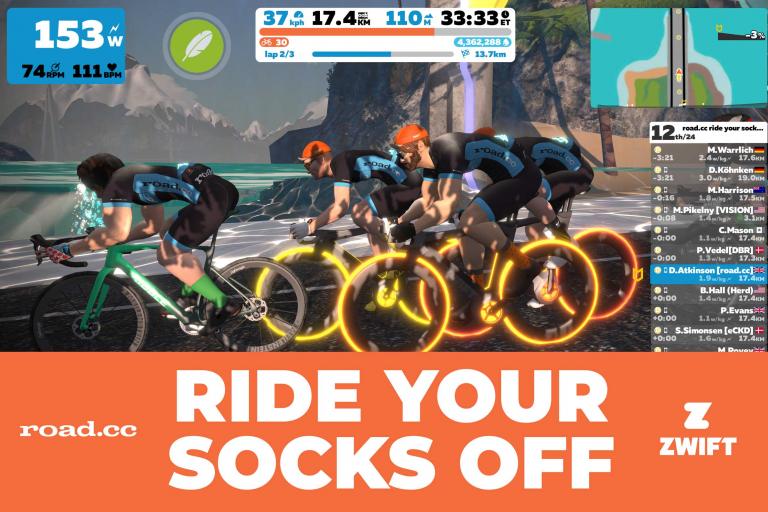- News
- Reviews
- Bikes
- Accessories
- Accessories - misc
- Computer mounts
- Bags
- Bar ends
- Bike bags & cases
- Bottle cages
- Bottles
- Cameras
- Car racks
- Child seats
- Computers
- Glasses
- GPS units
- Helmets
- Lights - front
- Lights - rear
- Lights - sets
- Locks
- Mirrors
- Mudguards
- Racks
- Pumps & CO2 inflators
- Puncture kits
- Reflectives
- Smart watches
- Stands and racks
- Trailers
- Clothing
- Components
- Bar tape & grips
- Bottom brackets
- Brake & gear cables
- Brake & STI levers
- Brake pads & spares
- Brakes
- Cassettes & freewheels
- Chains
- Chainsets & chainrings
- Derailleurs - front
- Derailleurs - rear
- Forks
- Gear levers & shifters
- Groupsets
- Handlebars & extensions
- Headsets
- Hubs
- Inner tubes
- Pedals
- Quick releases & skewers
- Saddles
- Seatposts
- Stems
- Wheels
- Tyres
- Health, fitness and nutrition
- Tools and workshop
- Miscellaneous
- Cross country mountain bikes
- Tubeless valves
- Buyers Guides
- Features
- Forum
- Recommends
- Podcast
news
"I'll smash your f**king head in": bar owner's cycle lane parking threat; Car occupants 'threw coins and spat at' cyclists; Essex cops remove 'cyclists on footpaths' tweet; Indie band's cycle camera tant-strum + more on the live blog
SUMMARY
 bar vino restaurant owner clip 3 - via thomas cornwallis.PNG
bar vino restaurant owner clip 3 - via thomas cornwallis.PNG13 July 2020, 15:21
Colchester Police account appear to remove 'cyclists on footpaths' tweet... as accompanying photo shows a police car parked on the path
So it's not ok to cycle on the path but it looks like it is fine to drive on it? #cycling pic.twitter.com/T07Ci3TtJ2
— Richard Chambers (@dukeofted) July 13, 2020
The Essex Police in Colchester account has since tweeted a similar message with no images, as it was picked up on that the screenshotted post above appears to show a police car parked up on the footpath in question.
People only cycle on the path because they don't feel safe on the road. This is what needs addressing @EssexPoliceUK
— Frances Bell (@carfreeinessex) July 13, 2020
Also lol @ the idea that this is an education problem. Most people know they're not supposed to cycle on the pavement, but they do it because the road is insanely dangerous and they don't want to die
— Hannah 🚲 (@theeyecollector) July 13, 2020
Some have accused the force of avoiding the greater issues in 'educating' cyclists against pavement cycling.
13 July 2020, 14:46
Florida cyclist’s bizarre crash after an iguana gets stuck in his front tyre
A South Florida man’s Friday morning bike ride took a painful turn when an iguana darted out in front of him and caused him to crash https://t.co/pkJOdHaIZH
— NBC 6 South Florida (@nbc6) July 10, 2020
The 62-year-old cyclist reported that the iguana shot out from a grassy area and got lodged in his tyre, causing his bike to lock up and sending him over the handlebars. A County Sheriff's Office deputy attended, and found the cyclist with cuts to his right leg, arms, and head.
NBC Miami report that the cyclist was in a stable condition, but the iguana "unfortunately, did not make it"...
13 July 2020, 13:57

Join us at 7pm tonight on Zwift!
There's another chance to win road.cc socks on Zwift tonight (7pm BST) and get some indoor miles banked in the process. Tonight's ride is a C category, so a bit quicker, and it ends with the Volcano KOM to open up the lungs a bit! Hope to see you in Watopia later.
13 July 2020, 15:51
13 July 2020, 13:10
Indie band's cycle camera reporting tant-strum
Imagine how many jobs he’s cost, marriages and livelihoods by being a busy bastard. Don’t condone this at all. https://t.co/CbPnIMlNxU
— The Jackobins (@TheJackobins) July 13, 2020
The Jackobins (me neither) have waded into a minefield by taking issue with YouTuber CycleGaz, who regularly uploads footage of bad/dangerous driving to the police. Recently he announced that over £20,000 in fines have been dished out from his reporting alone.
Whoever is in charge of the band's account accuses him of being a "busy bastard" by catching drivers with a camera, claiming that he has "a plastic police badge in his pocket."
How is he going out of his way? If you happen to be passing a driver who's on their phone or have someone overtake you dangerously close that's not "going out of your way" to find them. You really don't get this do you? Maybe if one of these dangerous drivers kills someone you
— Mark Skrzypczyk (@bassjunkieuk) July 13, 2020
Imagine if he saw someone nicking all your gig gear and didn't report it for fear of being called a "busy bastard". Imagine that.
— Tom Jeffs (@tom_a_jeffs) July 13, 2020
This about sums it up.https://t.co/MyQyqt2Ksd
— Green Steve (@Green_Steve) July 13, 2020
"getting a fine in the post for breaking a red light ruined my marriage" - I hear it all the time.
— Oisín O'Connor (@OConnorOisin) July 13, 2020
It appears quite a few people don't agree, including Superintendent Andy Cox who thanked CycleGaz for "his incredible public service" at the weekend.
The Jackobins Twitter account admin persisted, saying they "don’t condone people taking the law into their own hands to intentionally film drivers"; although some have reminded them that witnessing a crime and reporting it to the police is kind of the opposite...
13 July 2020, 12:39
Glasgow cycle lane row: anonymous person claiming to know restaurant owner accuses cyclist of "gaslighting"
I have no clue who you are... I do not have time for this or what you have been saying. I have pattern of advocating for safer streets, I have habit of requesting that mutual respect is given to our cycleways. It's not that hard to park legally and treat others with respect.
— Thomas O Cornwallis (@UrbanistTOC) July 13, 2020
The anonymous Twitter account has disputed Thomas Cornwallis' version of events, claiming that the owner of Bar Vini is "kind and giving" and is being targeted unfairly.
The account holder says: "Look at the picture in the paper, and though it's clear his wheels are on the kerb, he's barely touching the cycle lane. You, on the other hand, have parked your bike in the middle of it while you pull your camera out to make a scene, and project your agenda on to this person...
"and set out to ruin his business by getting your followers (who have never been to the restaurant) to post one star reviews on google. It's despicable, and it's no wonder that people like you give cyclists and progressives a bad name. It's cyber-bullying, and it's in bad taste.
"Anybody here with half a brain might understand that most people don't just wake up in the morning and decide to be violent, without some sort of provocation. It's pretty clear from your videos that this is what's happening."
Denying that he was trying to provoke Bar Vini's owner, Mr Cornwallis claims Matteoni told him he can't cycle there again or he would "get it", and "didn't look for anything that day."
13 July 2020, 11:49
"I'll smash your f**king head in": Glasgow restaurant owner threatens cyclist over cycle lane parking
I am still sitting on my bike, and quickly approach’s me whispering “not today”... which when the following occurred:
4/n pic.twitter.com/KbLAamIoGP
— Thomas O Cornwallis (@UrbanistTOC) July 13, 2020
A cyclist has shared footage of a Glasgow restaurant owner threatening to 'smash his head in' in a dispute over his parking in a cycle lane.
Thomas Cornwallis said "why is there so much hatred in our society towards the humble bicycle?", along with a Twitter thread and accompanying clips of the exchange, that he claims started off cordially before Bar Vini's owner Adriano Matteoni became aggressive.
Mr Cornwallis continued: "He (Matteoni) pulled in, onto cycleway and decided to have a civil conversation. It was a bit ludicrous as basically he accepted he was doing wrong... I started to film when got closer to me.
"When above video ends, I move off, at this point nothing has seriously happened. I stop quickly to photography all cars there, to use as evidence for requesting support from council. He bounces back in, and starts to get aggressive.
"I am still sitting on my bike, and quickly approach’s me whispering “not today”... which when the following (the incident in the video above) occurred:
"You can see at end video I prepare to cycle off. I stopped filming as I just wanted to leave. He attempted to grab me and ran down pavement shouting more abuse and threats. The threats where to do with his basement, assault and never showing my face again."
Mr Matteoni has defended his actions and claimed that his business is actually 'cyclist-friendly', telling the Glasgow Times: "Many of our valued customers are cyclists. We have bike racks outside the shop. We welcome any cyclists to come by on their morning or evening commute.
"Any business owner will understand that during deliveries and loading times, we need to cross the footpath and cycle lane to deliver goods to serve our customers.
"The double lines are new, and we'd love to engage the council to put in a loading zone for all businesses on the strip - rather than to make things for more difficult for business during these times."
13 July 2020, 12:23
Another modal filter before and after
@SalfordCouncil have added filters across the Trinity and Adelphi areas - meaning cyclists of all ages and ability can move about safely.
If you mostly drive around here, there's never been a better time to get on your bike to work or walk to the shop. pic.twitter.com/buHERa7kDb
— Walk Ride Salford Central (@WRSalford) July 13, 2020
Another example of how humble planters are transforming streets (apart from those occasions where drivers ignore them), this time in Salford.
13 July 2020, 11:33
It's been a year since De Gendt's epic 200km breakaway
One year ago today, @Lotto_Soudal's @DeGendtThomas did what he does best - setting off on a 200km breakaway and hanging on to win stage eight of the 2019 Tour de France. What a ride! 🎥 #TDF pic.twitter.com/0c6gJnjP8q
— Velon CC (@VelonCC) July 13, 2020
In a pandemic-free parallel universe we'd be in the thick of Tour de France action right now, and this time last year Thomas de Gendt pulled off a stunning victory after riding out on his own for 200km. In the end Julian Alaphilippe was just 6 seconds behind as he crossed the line in second place to take the yellow jersey.
13 July 2020, 11:38
In lieu of a real-life Tour, this'll have to do for now...
13 July 2020, 10:11
Cyclist recounts horrific assault, with car occupants spitting and throwing coins before pushing her partner off his bike
& on the third day, we got shouted at, then spat at, had coins thrown at us, then the passenger pushed theo off his bike from the car window. on a *30 minute* ride https://t.co/hNB39EMUmU pic.twitter.com/uHCXOu10lx
— honor elliott (@honorelliott_) July 12, 2020
Tekkerz CC club cyclist Honor Elliott claims the assault took place just 30 minutes into a ride with her partner Theo, with his injuries show in the photo above after a car passenger pushed him off his bike. Ms Elliott continued:
"We hadn’t said a word the entire time. they initially shouted something at us while overtaking (presumably for being 2 abreast). Theo did a polite wave. They stopped ahead on a jct waiting for us to come past but we turned off before their car to ignore. they turned & followed,
"...started throwing coins & spitting. When they continued to get no response from us whatsoever, passenger leaned out & pushed Theo, who thankfully has enough bike tekkerz to unclip & not end up under the car, went into the wall instead. Then they got out the car & threatened to take theo aside for a fight lol, but thankfully an oncoming car appeared, they started filming & said they’d be witnesses. The two guys then abruptly changed tune and decided to leave it at that, hah. Absolute man babies.
"I’ve always firmly believed a cyclist’s retaliation to hostility/violence from motorists is completely irrelevant anyway (stop expecting people to react rationally to potential threats to life), but shit like this really proves my point. these people are crazy regardless."
Ms Elliott has said she will report the assault.
13 July 2020, 10:35
GP5000's with a cheeky tan? Yes please!
13 July 2020, 08:35
UK Sport release statement defending Ketone Ester project that involved British cyclists at 2012 Olympics
UK Sport have released a statement defending the use of a ketone energy drink at the London 2012 Olympics, after a Daily Mail investigation accused them of using athletes as "guinea pigs" to test the substance for the US Special Forces.
It was given to a reported 91 athletes - including British Cycling team members - in the form of an energy drink called DeltaG, and included a synthetic version of ketones, which is a naturally occurring body acid. Similar products have since been made available commercially (including HVMN Ketone as reviewed by road.cc) but the Daily Mail's report found that UK Sport made athletes sign a non-disclosure agreement banning them from talking about the trial, and there were a number of adverse side effects. The report also claims that there were "no guarantees" the experiment wouldn't breach anti-doping laws; although ketone products are not on WADA's banned list.
Full UK Sport statement on Ketone Ester research and innovation project.
Read here ⤵️
— UK Sport (@uk_sport) July 13, 2020
UK Sport's statement denies that athletes were used as "guinea pigs" or that the Ketone Ester was anything to do with testing for Special Forces, claiming it "received independent ethical approval from the Research Advisory Group in January 2012". They also got confirmation from UK Anti-Doping, following clarification from the World Anti-Doping Agency, that the substance athletes ingested wasn't banned.
The statement continues: "Decisions which lie at the heart of the high performance system need to be made with absolute transparency, are respectful and the impact of these decisions understood and carefully managed. UK Sport is fully committed to developing a high performance culture that is truly inspirational and one that will set us apart from our global competitors – but UK Sport will never seek to win medals at any cost.
"UK Sport resolutely refutes any accusation that Olympians were used as ‘guinea pigs’, and finds this allegation both misleading and offensive. For the purposes of clarification and transparency, we are publishing greater detail on this project, provided by Professor Kieran Clarke, Professor of Physiological Biochemistry, University of Oxford:
"The ketone ester was being researched to see if, and how, it could improve exercise performance and recovery in athletes, by helping prevent muscle breakdown and supporting recovery of muscle glycogen.
"Many human studies, including safety studies, had been run before the 2012 Olympics in a $10 million project funded by the Defense Advanced Research Projects Agency (DARPA), which started in 2003. The DARPA project had nothing to do with US Special Forces.
"By 2010, the ketone ester had been through all the safety studies required to sell it as a food in the US and it had been registered with the US FDA as Generally Recognised as Safe (GRAS). The ketone ester was 100% pure and, therefore, contained no banned substances and is exactly the same as the ketones produced in the body from fat and used for energy during exercise. For clarity, the ketone ester is not a “drug”, but a food, containing as many calories as glucose and has been verified by the US FDA, the UK MHRA and WADA. Professor Kieran Clarke states any experienced “side effects” of ketone ester have been mild and short-lived (i.e. lasting minutes).
"The studies themselves, all of which had ethical approvals, had nothing to do with seeking to break or push the boundaries of anti-doping laws. WADA could see no reason why ketones, normally found in the body, could not be used in competition. The athletes were given information on the biochemistry of ketones to aid understanding and provided informed consent when taking part.Professor Clarke was aware of this research with high performance athletes without knowing their specific identities.
"We will continue to report the facts of this research."
13 July 2020, 09:47
Have you experienced snobbery out on the road? Cyclist says group 'criticised bike' and riding ability
I find it so rude when cyclists criticise my bike. I Went past a group of about 8 men and everyone of them criticised my bike or riding ability. I’ve been riding for less than two years and I’m a student who doesn’t earn money. Also I rode PAST them soo.. 🙄
— Ruth Sinclair (@RuthSinclair4) July 12, 2020
A tweet from a female cyclist is going viral after she claimed a group of eight male cyclists all took it upon themselves to criticise her bike and riding ability... as she rode past them. While our sport does have something of a reputation for attracting some folk who have more money than sense, how commonplace is this kind of snobbery? Do let us know your experiences in the comments...
13 July 2020, 09:09
Build it and they will come: Manchester's A56
The #A56 this morning. These are the people who want to cycle. When they feel safe they get on their bikes. For so many people I spoke to this was their first go cycling on a main road. That means that normally they would drive! #BuildBackBetter @Chris_Boardman pic.twitter.com/zEpoqw62Nx
— Cheryl Law (@LawCheryl) July 11, 2020
It would have been unthinkable to see so many cyclists safely pedalling along one of the busiest roads in Manchester just a few months ago... but this pop-up has made the scene above possible.
13 July 2020, 09:00
13 July 2020, 08:14
Weekend catch-up
Spent all weekend in a bunker avoiding those pesky flying ants? Here's what you missed...
Gail Porter, Laura Kenny and Nicole Cooke among Cycling UK’s 100 Women in Cycling
New Zwift route to ride as Virtual Tour de France brings users the Casse-Pattes circuit
Final round of London Streetspace funding announced
Drug driver who killed Essex cyclist jailed for 28 months
CPS declines to prosecute speeding motorcyclist who killed 13-year-old cyclist
Near Miss of the Day 440: Skip lorry driver undertakes cyclist
13 July 2020, 11:40
Can't see the comments? Click here.
Jack has been writing about cycling and multisport for over a decade, arriving at road.cc via 220 Triathlon Magazine in 2017. He worked across all areas of the website including tech, news and video, and also contributed to eBikeTips before being named Editor of road.cc in 2021 (much to his surprise). Jack has been hooked on cycling since his student days, and currently has a Trek 1.2 for winter riding, a beloved Bickerton folding bike for getting around town and an extra beloved custom Ridley Helium SLX for fantasising about going fast in his stable. Jack has never won a bike race, but does have a master's degree in print journalism and two Guinness World Records for pogo sticking (it's a long story).
Add new comment
45 comments
Gary's bike channel
|
4 years ago
2 likes
i cycled on the pavement today with my girlfriend. The road in winton, well at the start of it the path is split into two sides, with one for bicycles, the other for pedestrians. There is no end of route sign. The paint just vanishes. My girlfriend kept saying she felt too afraid to cycle on the road so could we use the pavement. I said yes, and if we do get stopped I have mitigation on this. One, you could argue the pavement was still a shared path, as the lack of end of route sign, allbeit a mile away, is still not adequate signage. The other point being safety, i would argue with any police office who tried to ticket me and quite possibly make them look an arse. No way would i accept a ticket for cycling at 5mph , out of fear for my girlfriends life, just so we can visit the shops instead of driving. As long as you're sensible and have genuine reason for using the pavement instead of the road, i have no issue with people cycling on the pavement if they are careful. Blame the government for failing to provide adequate cycle lanes, not the public who are too scared of people driving two tonne machines around making it a horrible place to ride a bike.

LetsBePartOfThe...
|
4 years ago
2 likes
Colchester police versus cycling on "footpaths"....
.... I am not familiar with the location in the image, but it appears to be a footway rather than a footpath. The arguments and legalities for and against cycling on either of these are varied, but are also different.
It would be helpful if the police could at least correctly identify the actual type of right of way it is, first, and before attempting to identify a supposed corresponding contravention.


EddyBerckx
|
4 years ago
4 likes
After resisting all day I finally looked at that Ruth Sinclair thread.
IT WAS EVERYTHING I KNEW IT WOULD BE.
That is, an unmitigated, relentless tirade of demonisation, bigotry, hate and reverse snobbery towards a much maligned minority group that are routinely viciously attacked and abused for no reason other than they exist.
The scum on that thread are rightly horrified when they see bigotry and discrimination towards certain minority groups...yet push the right button and all of a sudden they turn into a raging Daily Mail communtard. Its worrying how people are so quick to lump groups together as being all the same by which I mean, all bad.
So fucking predictable and honestly, I think she knew that is how it would turn out. She's certainly not told the attack dogs to calm down. Not good enough.
It's a tricky one isn't it? Because we only have one side of the story, we don't know what really happened.
When I hear the accusation 'male, pale and stale' (guilty, your Honour), I do wonder if that is 'getting your own back' rather than 'living your ideals' of not judging people on characteristics they didn't choose.

A candidate for the Didn't Happen Of The Year Awards if ever I saw one. There is nothing so full of self-righteous indignation than a social media mob of slow cyclists laying into The Lycra Brigade. It's bizarre - they're worse than drivers for it. All eight cyclists were rude about her? Really? If that's true I'll either eat my hat, or her riding was appalling for someone who's been riding two years (don't believe the latter for a second). Sounds to me like she went past a group of blokes who then happened to pass her again (as is always going to happen unless she's making a solo break for a stage win ffs) and she got the arsehole about it then decided to post on social media to make herself feel better. Cue the usual 200 odd people jumping all over it to shout about 'mansplaining' or 'Tour de France wannabes', posting pictures of the bike they dug out of the ground last year and claiming tales of derring do about smoking a peloton of lithe racing snakes up Hardknott on it, or accusing anyone who rides faster than them of 'not being real cyclists' because they're not riding a penny farthing. Guaranteed there's some melt on the thread who chimes in about 'us' lycra clad weirdos not waving at them as well.
It's all in their imagination.
Could just be me as a sad male well past his prime but if a young lady came past me on a hill and powered away on a shapely set of muscular legs, I'd probably take a moment to look heavenwards and silently praise a God I don't usually believe in before doing my best to keep her in sight.

Could just be me as a sad male well past his prime but if a young lady came past me on a hill and powered away on a shapely set of muscular legs, I'd probably take a moment to look heavenwards and silently praise a God I don't usually believe in before doing my best to keep her in sight.
You know you said that out loud, right? 

eburtthebike
|
4 years ago
1 like
The Jackobins' comments are crass, and their music isn't much better; their latest single is two minutes of pretentious intro followed by uninspired average rock, and a pretty pretentious end too. You can hear it on their fb page https://www.facebook.com/jackobins/
From a review of it "The band have suggested that the release is written as the anchor song for the wider themes that the band will explore in 2020, the “predominant ones being toxic masculinity,..."
Maybe they could start with their own.
Here they are looking really serious and macho



Municipal Waste
|
4 years ago
1 like
Genuine question: would it still be mansplaining if I told something about the bike given I actually do have legit credentials (17 years bike trade)?
If so, would it be mansplaining for a male doctor to inform a female (maybe it makes a difference if they're known to them) that they've seen a symptom that they should get checked out? Maybe it's a rash or they overheard a conversation about symptoms.
I guess the question being in some respects: How does one know whether something is gender driven or genuine wish to help?


peted76
|
4 years ago
3 likes
Reference Ruths tweet 'about 8 men and everyone of them criticised my bike or riding ability. I’ve been riding for less than two years and I’m a student who doesn’t earn money. Also I rode PAST them soo..'
1) there are so many holes in this it makes no sense to me. 2) I feel sorry that Ruth had some sort of bad experience. 3) 639 comments, 154 retweets and 5000+ likes on her tweet offering support, sympathy to her.
This feels like some sort of movement based on emotion and not fact. Most of what I can see, mamils like me are being vilified for something I know nothing about. Raging against the machine in my thought process, but, I suggest young ruth the student triathlete might have caused the eight men to say something to her as she cruised past them, it could have been anything mind, maybe her pump looked like it was falling out of a pocket for all we know and she mistook the mumblings of eight male cyclists offering help to her as intimidating critique.
That said, there's a lot of people who can't help but offer unwanted advice to other people out there, I've certainly been known to do so myself.

It does feel a bit... off. Had it been "one man in a group of eight" I wouldn't have batted an eyelid, but all eight, all giving this girl shit for no reason as she passed them? Would love to hear from one of the guys in the group, if only for internet gossip reasons.

fredca_91
|
4 years ago
5 likes
Yesterday, Sunday at 1PM in Regent's Park inner circle, a car started honking frequently behind me and my friend while we completed almost a full lap, meaning the car either was looking for a spot to park or get out of the inner circle. I was wrong. At one point I waved to tell them to overtake us and end the honking.
That's when the polite lady who was the passenger, lowered the window and yelled: "She's learning, you w****r!!!!" and drove off. What a lesson she must've taught to the younger driver who will probably mirror what she learned.

eburtthebike
|
4 years ago
0 likes

The local newspaper have kindly included a snippet of the filming. Disturbing and unpleasant to watch!
Thanks, watched it. I reckon he's seen "The Godfather" a few too many times.
This is a google map snip of the place, from August 2019, and it looks like that's when the cycle lane was put in. There's no way the council would have put it and parking restrictions in without consulting local businesses. I don't see any cycle racks either, but they could have been installed later.




brooksby
|
4 years ago
7 likes
Mr Matteoni has defended his actions and claimed that his business is actually 'cyclist-friendly',
Coming from someone who's on film screaming "I'll smash your head in!" to someone who's criticised him parking in a cycle lane (even if 'only for loading'), you'll have to forgive me if I think he's only doing what Private Eye refers to as a 'quick reverse ferret' for the purposes of mitigating the bad publicity...


Hirsute
|
4 years ago
0 likes
Smash your *&%^ing head in
"It's all a game and a form of entrapment looking for more 'poor me' footage to upload on social media. The police should be pulling more of these saddo types of cyclists over pointing out how inconsiderate their attention seeking all is. Maybe check on their general welfare while their at it. "
I guess I'd better ditch the camera then in this entrapment I am perpetrating. Although I have more success uploading to the essex police platform.
Pages
Latest Comments
- Jogle 4 hours 39 min ago
Mystery over upturned campervan in Brittany...
- Barraob1 5 hours 23 min ago
Is that justification for murder?
- ktache 5 hours 31 min ago
I have recently obtained a SPD axle removal tool from eBay, ali, anodised in blue, wanted orange. I presume it's Chinese made, too much of a...
- ChasP 5 hours 32 min ago
I find it helps particularly with a brand new tyre that retains it's folded shape to seat it with an inner tube and leave for a while. You can then...
- Rendel Harris 6 hours 11 min ago
It's not available on the NHS but it can legally be prescribed by private doctors.
- ktache 6 hours 16 min ago
Was thinking about getting a Rohloff one, but then I got a Rohloff which made it a bit pointless. And, of course I only found about it when I was...
- pockstone 7 hours 33 min ago
If one's knuckles are several inches below one's ankles...?







